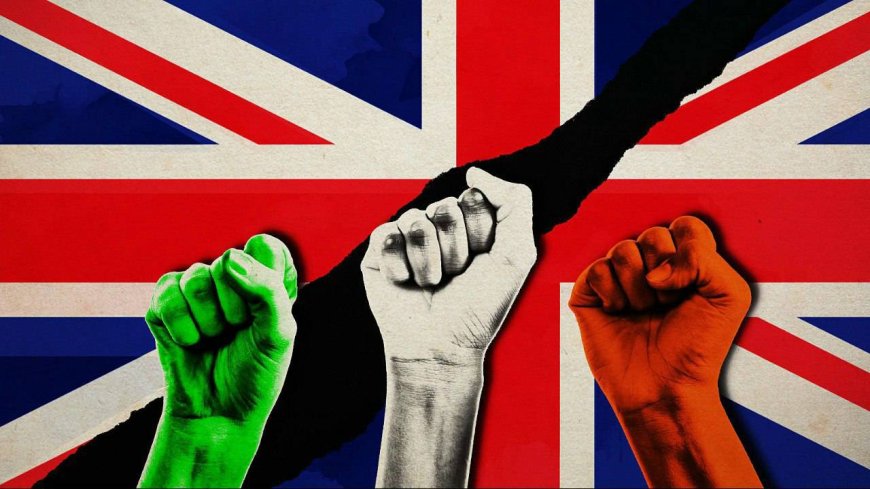Has the possibility of the UK's breakup increased with Sinn Féin's victory in the Northern Ireland elections?
Has the possibility of the UK's breakup increased with Sinn Féin's victory in the Northern Ireland elections?

By: A. Mahdavi
Sinn Féin has secured a staggering 144 seats in the local council, which is a significant increase of 39 seats from the previous period. This unprecedented achievement has propelled Sinn Féin to the forefront of the political scene, making it the first party to achieve this kind of political accomplishment. The DUP, the Unionist party with 122 seats, has experienced a significant decline since 2017, culminating in a near-total defeat.
Many political commentators in the United Kingdom believe that the recent election results have been nothing short of historic, with Sinn Féin securing victories in traditionally unionist constituencies like Belfast, Ballymena, and Coleraine, which is a testament to Sinn Féin’s impressive political performance. However, it's important to note that this is just one aspect of the larger story at play here. The triumph of Sinn Féin can be analysed through various lenses and is indicative of the transformation taking place within Northern Ireland's politics. One possible reason for their success could be attributed to Sinn Féin’s election slogan, "Job for All," which resonated with a significant portion of the middle class and helped secure the grey votes.
The unionists' refusal to join forces in the formation of the local government created an opportunity for Sinn Féin to position itself as a nationalist movement and advocate for a united Ireland. This strategic move allowed Sinn Féin to win support from both its traditional base and unionist voters.
According to some nationalist voters, the Democratic Unionist Party's decision to boycott the House may be attributed to the appointment of Sinn Féin’s first Minister of Agriculture and the Environment, Michelle O'Neill, as Prime Minister. According to some observers, the unionist party appears to be unwilling to accept a subordinate position, as their deep-rooted prejudices pose a significant hindrance.
The unionists' poor performance has incited a great deal of anger and frustration among their ranks, as demonstrated by the recent election results. Sinn Féin has adeptly capitalised on the current social crisis and decline in public services, attributing these issues to the rejection of unionists from taking part in the coalition government.
The recent election has conveyed an important message, emphasising the need to restore public confidence, cultivate political cooperation, and form an efficient government. Obviously, this should serve as a warning to unionists, as the current political disillusionment could prove detrimental to the Tories' success in Ireland's forthcoming House of Commons elections. The unionists and Tories' elites must push for a reorganisation of their political campaign and even prepare for a potential alliance with Sinn Féin.
In Northern Ireland's political landscape, an important aspect to consider is the essential function of local councils in driving political change. The current situation provides Sinn Féin with a unique chance for them to prove their mettle as the leading political party, to exhibit their efficiencies to the voters, and to exercise the authority granted to them by the councils to offer some redress for the deficiencies of the former administration. Meanwhile, as we delve deeper into the matter at hand, it is imperative to acknowledge the significant shift in the social fabric of Northern Ireland. For the first time, the Catholic population has outnumbered that of Protestants in Northern Ireland. Furthermore, the younger generation is displaying a greater inclination towards Irish nationality, indicative of a growing sense of Irish nationalism that is shaping the social dynamics of Ireland. This is a complex matter that requires thorough analysis.
In fact, the growing divide between the younger generation and the values held by unionists represents yet another existential threat to the United Kingdom. Many young people feel disconnected from these values and doubt the unionists' ability to build a bright future. This perception of ideological decay has only served to widen the gap between the two categories. The current condition of Irish society shows the inclination for Ireland's unification.
Although unionists did not lose any seats in the recent election and gained the same number as in the previous period, Sinn Féin and Irish Unity's leap to 67 seats may harbinger the collapse of the United Kingdom. This could pose a significant challenge for the United Kingdom, particularly as London faces mounting pressure from the Scottish independence movement. The Irish have a lengthy history of pursuing independence from the United Kingdom, and the continued existence of the Irish Republican Army is a testament to this fact. The current challenge at hand, coupled with the low approval ratings of Charles III, who has failed to match the popularity of his mother, has intensified the significance of the sociopolitical crisis in Northern Ireland.
These results confirm the fact that Northern Irish voters are increasingly invested in Irish affairs rather than those of the UK. This poses a formidable challenge for Buckingham Palace and 10 Downing Street in the foreseeable future. As we look ahead, the questions that loom large are those that hinge on the actions of the local Irish government and the political establishment in London alike.













































